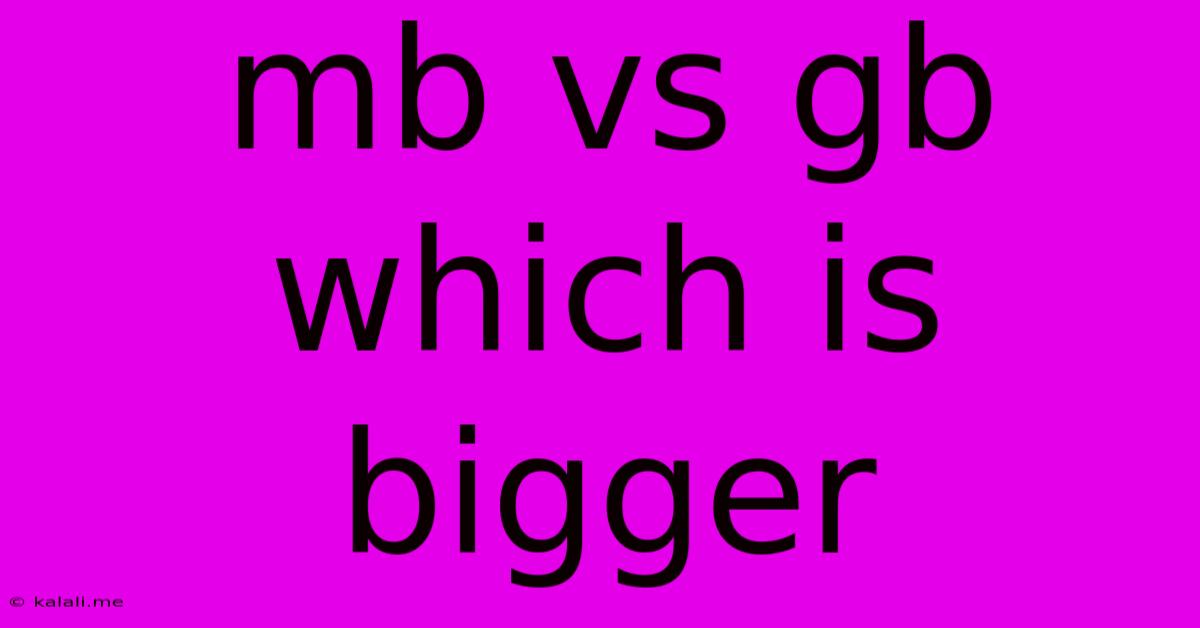Mb Vs Gb Which Is Bigger
Kalali
Jun 12, 2025 · 3 min read

Table of Contents
MB vs GB: Which is Bigger and What's the Difference?
Understanding the difference between MB and GB is crucial in today's digital world, whether you're buying a new phone, choosing a cloud storage plan, or simply managing files on your computer. This article will clearly explain the relationship between megabytes (MB) and gigabytes (GB), helping you confidently navigate the complexities of digital storage.
Megabytes (MB) and gigabytes (GB) are both units of digital storage capacity, representing the amount of data a device can hold. They are related through a simple power of ten relationship, which we will explore in detail below. Choosing the right storage capacity depends on your needs, whether it's for photos, videos, applications or games.
Understanding the Units: Megabytes (MB) and Gigabytes (GB)
The core difference lies in their size: a gigabyte is significantly larger than a megabyte. This size difference is based on the powers of ten (or two, depending on the context, but we'll stick to the simpler power of ten explanation here).
- Megabyte (MB): One megabyte equals one million bytes (1,000,000 bytes). Think of it as a relatively small unit of storage. A typical song file might range from a few MBs to tens of MBs.
- Gigabyte (GB): One gigabyte equals one billion bytes (1,000,000,000 bytes), or 1,000 megabytes. This is a much larger unit of storage commonly used for things like movies, operating systems, and large game files.
The Relationship Between MB and GB
The key takeaway is that a gigabyte (GB) is 1000 times larger than a megabyte (MB). This means that if you have a 1 GB file, it's equivalent to 1000 MB files. Understanding this simple relationship is crucial for interpreting storage specifications and file sizes.
Real-world Examples
To further illustrate the difference, consider these examples:
- High-Resolution Image: A single high-resolution photo might take up 10 MB of space.
- Full HD Movie: A full-length HD movie can easily occupy several gigabytes (GB), ranging from 2 GB to 20 GB or more, depending on the length and quality of the video.
- Operating System: Operating systems like Windows or macOS typically require tens of gigabytes of storage space for installation.
Understanding the scale of these units is vital for managing your digital storage effectively. You need to consider your storage needs and choose a device or cloud storage plan with enough capacity for your files.
Beyond MB and GB: Terabytes (TB) and Petabytes (PB)
While MB and GB are common units, you will encounter even larger units such as terabytes (TB) and petabytes (PB). A terabyte (TB) is 1000 gigabytes, and a petabyte (PB) is 1000 terabytes. These are used for incredibly large datasets, such as those found in data centers or for archiving extensive video libraries.
In conclusion, understanding the difference between megabytes (MB) and gigabytes (GB) is vital for navigating the digital world. Remember that a GB is 1000 times larger than an MB, and choosing the right storage capacity depends on your individual needs and the size of the files you work with. By understanding these fundamental units of storage, you can manage your digital data more effectively.
Latest Posts
Latest Posts
-
Tsunamis May Be Generated By
Jun 13, 2025
-
Which Word Is An Antonym Of Obsolete
Jun 13, 2025
-
What Are The Factors Of 97
Jun 13, 2025
-
Which Of The Following Is A False Statement
Jun 13, 2025
-
Is Ifsc Code And Swift Code Same
Jun 13, 2025
Related Post
Thank you for visiting our website which covers about Mb Vs Gb Which Is Bigger . We hope the information provided has been useful to you. Feel free to contact us if you have any questions or need further assistance. See you next time and don't miss to bookmark.